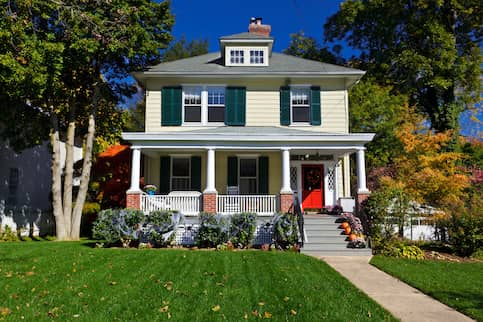One of the first decisions aspiring home buyers must make is whether they need a conforming or non-conforming mortgage. Conforming loans meet specific requirements, including a maximum loan amount. Non-conforming loans are any mortgage that’s not a conforming loan, including government-backed loans and jumbo loans.
Key Takeaways:
- Non-conforming loans are mortgages that don’t meet the definition of a conforming loan, which has specific requirements for borrowers and a maximum loan amount.
- Non-conforming loans include jumbo loans that exceed the limits on conforming loans and government-backed loans designed to help specific types of buyers afford a home.
- Requirements for non-conforming loans vary by loan type and lender preference.
What Is A Non-Conforming Loan?
Non-conforming loans are any loan type that’s not a conforming loan.
A conforming loan meets guidelines updated each year by the Federal Housing Finance Agency. The guidelines include financial requirements for borrowers and a maximum loan amount. Lenders can sell conforming loans to Fannie Mae or Freddie Mac, government-sponsored enterprises that package mortgages into investments sold and traded on secondary markets.
The most common non-conforming loans are jumbo loans and government-backed mortgages.
What’s Your Goal?
Buy A Home
Discover mortgage options that fit your unique financial needs.

Refinance
Refinance your mortgage to have more money for what matters.
Tap Into Equity
Use your home’s equity and unlock cash to achieve your goals.
Jumbo Loans
Jumbo loans, or conventional non-conforming mortgages, exceed the maximum loan amount for conforming loans.
Conforming loans in most of the United States are capped at $766,550 for a one-unit home in 2024. The limit is $1,149,825 in specific high-cost counties.
Buyers who need to borrow more than these limits need a jumbo loan. Interest rates on jumbo loans usually are competitive with those for conforming loans.
Since jumbo loans cannot be sold to Fannie Mae or Freddie Mac, the lender takes all the risk in making the loan and can set its own requirements. Common requirements for borrowers applying for jumbo loans include:
- A down payment of at least 10% of the purchase price, often 20%.
- A maximum debt-to-income ratio of 45%.
- A minimum credit score of 680.
Ready To Become A Homeowner?
Get matched with a lender that can help you find the right mortgage.
Government-Backed Loans
Government-backed home loans are tailored to specific buyers who may have difficulty getting a conforming conventional loan. The most common home loan programs are offered by the Federal Housing Administration, the U.S. Department of Agriculture and the Department of Veterans Affairs.
FHA Loans
FHA loans are designed to help borrowers with lower credit scores and less money available for a down payment afford a home. Borrowers with a credit score of at least 580 can qualify with a down payment of at least 3.5% of the purchase price. Borrowers also can qualify with a credit score of 500 to 579 and a 10% down payment. FHA loans also limit the amount you can borrow.
VA Loans
VA loans are available only to active-duty military personnel, veterans, and their eligible surviving spouses. There is no down payment requirement, no minimum credit score, and the home must be used as the borrower’s primary residence. Borrowers must pay a funding fee, and most VA loans have competitive interest rates.
USDA Loans
USDA loans help low- to moderate-income borrowers buy homes in rural areas. Borrowers must meet income limits, but the USDA requires no down payment, no minimum credit score, and closing costs can be rolled into the loan amount.
Take The First Step To Buying A Home
Find a lender that will work with your unique financial situation.
Non-traditional Loan Types
Any other type of loan that doesn’t meet the conforming loan limits is a non-conforming loan. Examples include balloon loans, where the borrower makes a large final payment to retire the loan, and interest-only loans.
Conforming Vs. Non-Conforming Loans
The best way to understand what’s different about non-conforming loans is to understand conforming loans.
Loan Limits
Conforming loan limits are adjusted each year to reflect changes in the housing market and variations in home prices by location.
Conforming Loan Limits For 2024
| Number of Units | Baseline Limit | High-Cost Area Limit | Alaska, Hawaii, Guam And The U.S. Virgin Islands Limit |
|---|---|---|---|
| 1 | $766,550 | $1,149,825 | $1,724,725 |
| 2 | $981,500 | $1,472,250 | $2,208,375 |
| 3 | $1,186,350 | $1,779,525 | $2,669,275 |
| 4 | $1,474,400 | $2,211,600 | $3,317,400 |
Credit Score
To get a conforming loan, you need a credit score of 620 or higher for a fixed-rate loan. Borrowers can get an FHA loan with a credit score as low as 500. Jumbo loans typically require a higher credit score, often 680 or higher.
DTI Ratio
Conforming loans require a DTI ratio of less than 50%. Non-conforming loans have different DTI ratio requirements. Jumbo loans typically require a lower DTI because lenders want to be sure you can afford the payments. Government-backed loans may allow a higher DTI ratio.
Loan-To-Value Ratio
Your loan-to-value ratio shows how much of your home’s value you can finance. The remaining amount is your minimum down payment. Conforming loans require an LTV of less than 97%, which equates to a 3% down payment.
A jumbo loan typically requires a higher down payment, usually around 20%, or an LTV ratio of 80%. Most government-backed loans require a relatively low LTV ratio. FHA loans allow an LTV of up to 96.5%, and VA loans usually offer an LTV of up to 100%, which requires no down payment.
Non-Conforming Vs. Conforming Loan
| Non-conforming Loans | Conforming Loans |
|---|---|
| Lenders cannot sell loans to Fannie Mae or Freddie Mac. | Fannie Mae or Freddie Mac can buy conforming loans to sell as investments in secondary markets |
| No limit on loan amounts. | Loans cannot exceed the FHFA’s conforming loan limits |
| Government-backed loans often have more lenient eligibility requirements. | All borrowers must meet FHFA eligibility requirements, which include a minimum credit score and a maximum DTI ratio. |
| Lenders can set their own requirements for jumbo loans. |
FAQ
Here are answers to common questions about non-conforming mortgages.
The Bottom Line
For many home buyers, non-conforming loans offer an alternative path to homeownership. Whether qualifying for a government-backed mortgage or being fortunate enough to afford a jumbo loan, non-conforming loans fit many aspiring buyers’ needs.

Miranda Crace
Miranda Crace is a Staff Writer for Rocket Companies, bringing a wealth of knowledge about mortgages, personal finance, real estate and personal loans for over 10 years. Miranda is dedicated to advancing financial literacy and empowering individuals to achieve their financial and homeownership goals. She graduated from Wayne State University, where she studied PR writing, film production and film editing. In her spare time, Miranda enjoys traveling, actively engages in the entrepreneurial community, and savors a perfectly brewed cup of coffee.












